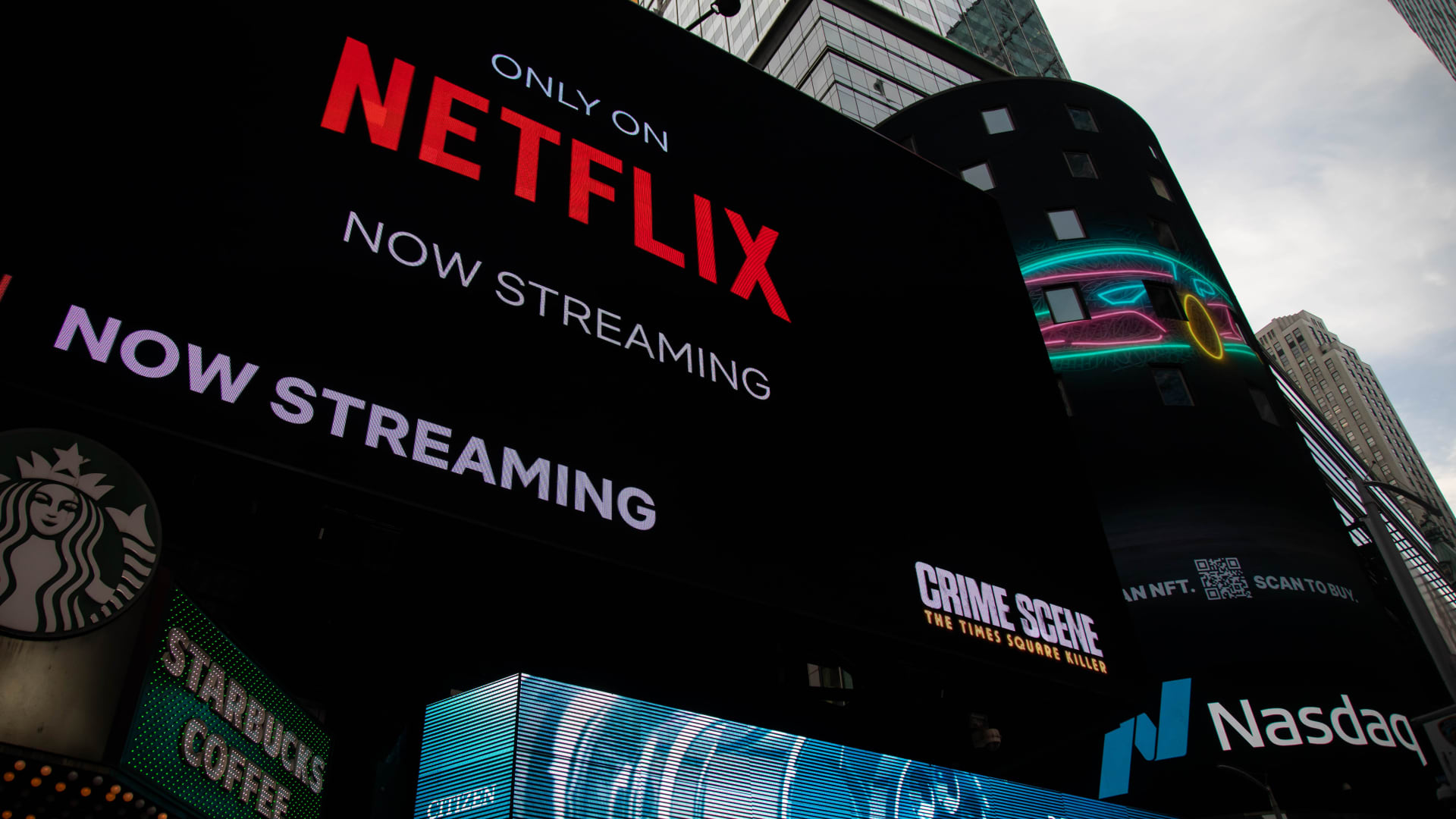
Netflix signage next to the Nasdaq MarketSite in New York, U.S., on Friday, Jan. 21, 2022.
Michael Nagle | Bloomberg | Getty Images
Netflix surprised the world this week, saying it plans to finally address the rampant practice of password sharing.
More than 100 million households are using a shared password, Netflix said Tuesday, including 30 million in the U.S. and Canada.
But the video streamer doesn’t plan to simply freeze those shared accounts. Instead, the company will likely favor the setting of an extra fee for those accounts being used by multiple people outside of the home.
Netflix’s plan to capture that lost revenue would start with an alert being sent to account holders whose passwords are being used by other households.
The company has already started a test of this feature in Peru, Costa Rica and Chile. For accounts that are sharing a password across addresses, Netflix is charging an additional fee to add “sub accounts” for up to two people outside the home. The pricing is different per country — about $2.13 per month in Peru, $2.99 in Costa Rica, and $2.92 in Chile, based on current exchange rates.
The company also allows people who use a shared password to transfer their personalized profile information to either a new account or a sub account, allowing them to keep their viewing history and recommendations.
“If you’ve got a sister, let’s say, that’s living in a different city, you want to share Netflix with her, that’s great,” said Chief Operating Officer Greg Peters during the company’s earnings conference call. “We’re not trying to shut down that sharing, but we’re going to ask you to pay a bit more to be able to share with her and so that she gets the benefit and the value of the service, but we also get the revenue associated with that viewing.”
Netflix didn’t say how much revenue it expects to generate from implementing its sharing strategy worldwide, though Peters said he thought it would take about a year to put its sub account pricing into use globally.
A survey from research organization Time2Play suggested about 80% of Americans who use someone else’s password wouldn’t get their own new account if they couldn’t share the password. It didn’t survey how many current account payers would be willing to pay more to share with others.
Peters also suggested the company may still tweak pricing or further review its test strategy.
“It will take a while to work this out and to get that balance right,” he said. “And so just to set your expectations, my belief is that we’re going to go through a year or so of iterating and then deploying all of that so that we get that solution globally launched, including markets like the United States.”
Unanswered questions
Netflix’s plan is unprecedented. No major streamer has ever cracked down on password sharing before. Other owners of streaming services, such as Disney, Warner Bros. Discovery, Comcast’s NBCUniversal and Paramount Global, will likely not set their own plans until after reviewing Netflix’s password-sharing reforms.
Some account holders will undoubtedly be surprised when they receive news from Netflix that their passwords are being shared. It’s also unclear how long Netflix would allow those watching on a shared account to maintain access if the primary account holder chooses not to pay the additional fee.
In addition, Netflix will have to tread lightly around defining password sharers to avoid wrongly tagging people as abusers, such as family members temporarily living away from home.
An unwillingness to act against this group of users would probably save millions of people from Netflix’s crackdown — at least to begin with.
“They’ll start with serial abusers,” said LightShed Partners media analyst Rich Greenfield. “If you have 15 people using your account, it’s pretty easy.”
The company also isn’t likely to want its employees mired in disputes about what classifies as a home account and what qualifies as a sub account. Contesting those definitions could get ugly for both staffers and customers, who have up until now seen Netflix as a best-in-class brand.
But “Netflix knows who you are,” said Greenfield, whether you’re using your own personalized profile or not.
Five years ago, Netflix actually encouraged password sharing. The company’s philosophy at the time was it simply wanted more eyeballs on its content, which in turn would create buzz and lead to actual subscriptions. That strategy seemed to pay off. Netflix subscriptions have grown every quarter for more 10 years — until last quarter.
In 2017, Netflix’s corporate account tweeted “Love is sharing a password.”
Now, the company would love it if you stopped doing so.
Disclosure: Comcast’s NBCUniversal is the parent company of CNBC.
WATCH: Netflix to test extra fee for password shares







